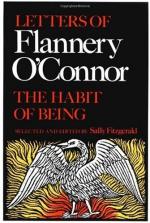|
This section contains 962 words (approx. 4 pages at 300 words per page) |

|
Hazel's blinding [in Wise Blood] is neither gratuitous nor contrived, for his act is a consistent resolution of the Oedipal theme in the novel and of the pattern of vision imagery which O'Connor uses to reveal this theme. Because Flannery O'Connor often mocks intellectuals and their feeble constructs, one does not expect to find a psychological situation as potentially hackneyed as the Oedipal complex in her fiction, but the Oedipal situation works throughout Wise Blood to complicate Hazel Motes's religious problems. It should be emphasized that Wise Blood is not a psychological case study, a fictional dramatization of Freudian orthodoxies. Flannery O'Connor's primary interest, as she said, was "the action of grace in territory held largely by the devil." Part of that territory in Wise Blood is her hero's memory of Oedipal fixation. Because Hazel associates his lost religious faith with memories of Oedipal guilt and anxiety, his...
|
This section contains 962 words (approx. 4 pages at 300 words per page) |

|


